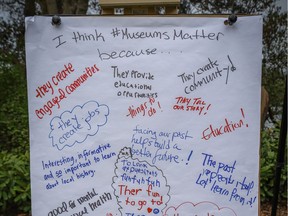Opinion: There’s a reason that nine out of 10 Canadians believe that museums matter. They preserve the past, so we can see ourselves in the present, and work towards building a better future.

Article content
On April 22, the B.C. Museums Association was invited to attend the closing day of Point Ellice House.
Advertisement 2
Article content
Vancouver Island Local History Society had operated the provincially owned heritage site since 2019 and announced this past spring that they would cease operations due to a lack of sustainable funding. We were invited to speak with their community and ask one important question: “Why do you think museums matter?”
Article content
As a recent national study from the Alberta Museums Association shows, Canadians overwhelmingly believe that museums matter — 94 per cent agreeing that museums can address societal issues, 88 per cent agreeing that they offer important perspectives, and 70 per cent agreeing that museums support community inclusion. When we asked community members at Point Ellice House, their responses largely aligned with the Alberta study. They said things like museums “create engaged communities” or “facing our past helps to build a better future.”
Article content
Advertisement 3
Article content
At the macro level, it’s easy to find consensus that museums matter, but what does “mattering” really mean on an individual level. Who is impacted when a museum closes? The B.C. Museums Association recently asked its more than 450 members to interview individual community members about how a museum, gallery, or heritage site has touched their lives. We were amazed by the diversity of stories we received.
One museum spoke about a retired volunteer who found community and meaning in digitizing more than 10,000 photographs over the past decade. An art gallery shared a story from a young, disabled artist who found a place of reflection and inspiration within their organization. A retired woman mentioned that she was able to learn her grandfather’s story through the museum’s collections. Another heritage organization shared a quote from a new volunteer: “I met some really great friends here … whatever skills you have, I’m sure there’s a museum that could use your help.”
Advertisement 4
Article content
Museums make a material difference in the lives of individuals in their communities. If you ask your neighbours, friends and family about their personal experiences with museums you’ll hear stories about going on dates with future partners, making memories with their kids, buying a favourite umbrella at a gift shop, learning something new about the community, or discovering a favourite work of art.
In the past three years in B.C., we’ve seen a museum and a gallery close due to lack of funding (Point Ellice House Museum and Gardens and the Bateman Gallery) and two museums destroyed in a wildfire (the Lytton Museum and Archives and the Lytton Chinese History Museum). Our sector is very much at risk and when a site closes, or ceases to exist, people lose meaningful experiences and opportunities and our communities are made immeasurably less rich.
Advertisement 5
Article content
Museums make a difference in the lives of British Columbians — there’s a reason that nine out of 10 Canadians believe that museums matter. They are educational spaces for life-long learners from all walks of life. They stimulate the economy and attract tourism. They help us grapple with big, difficult questions. They preserve the past, so we can see ourselves in the present, and work towards building a better future.
The Gulf of Georgia Cannery Museum shared a conversation with us from three of their long-time volunteers that said: “The museum is a part of my life. … It’s not just here to show the past, it’s a place to bring people together in the present — it’s amazing that one building can do all that.”
Ryan Hunt is executive director of B.C. Museums Association.
reference: theprovince.com


Comments
Postmedia is committed to maintaining a lively but civil forum for discussion and encourage all readers to share their views on our articles. Comments may take up to an hour for moderation before appearing on the site. We ask you to keep your comments relevant and respectful. We have enabled email notifications—you will now receive an email if you receive a reply to your comment, there is an update to a comment thread you follow or if a user you follow comments. Visit our Community Guidelines for more information and details on how to adjust your email settings.
Join the Conversation